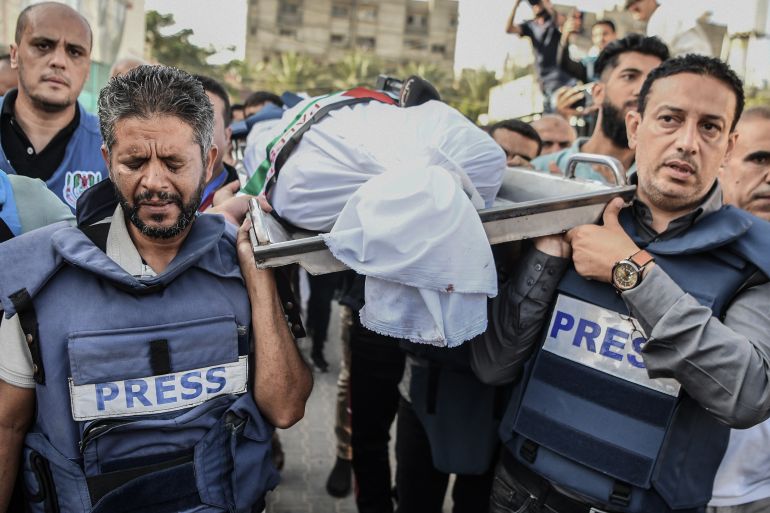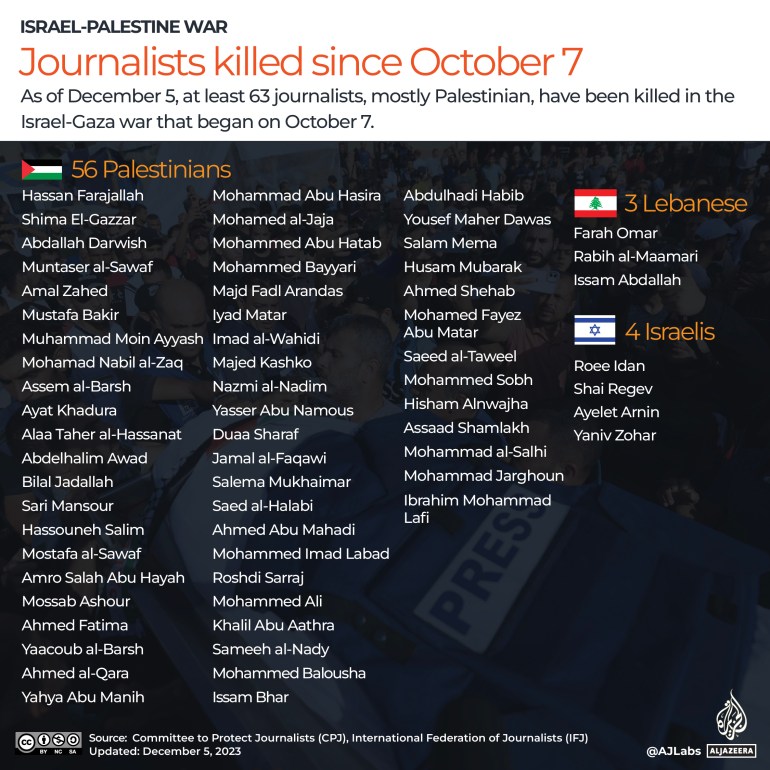The newsroom has become a battleground in Israel’s war on Gaza
And in the battle over how the war is reported from Gaza, journalists have been the primary victims.

Not too long ago, the world was witness to starkly contrasting images.
On the one hand, we saw Palestine TV journalist Salman al-Bashir on our screens, visibly grief-stricken following news of the death of his colleague Mohammad Abu Hatab. Hatab had been on air 30 minutes ago. When he returned home, Hatab and eleven of his family members were killed in an Israeli air strike.
Keep reading
list of 4 itemsNo let-up in Israeli attacks as Gaza truce efforts intensified
What’s behind the US generational divide on Israel’s war on Gaza?
UN chief urges Israel and Hamas to reach ceasefire deal in Gaza
Al-Bashir was reduced to tears: “We can’t anymore. We are exhausted, we are here victims and martyrs awaiting our deaths, we are one after the other and no one cares about us or the large-scale catastrophe and the crime in Gaza”. He then proceeded to take off his protective gear, adding, “No protection, no international protection at all, no immunity to anything, this protection gear does not protect us and not those helmets”.
We have also seen images from CNN, carefully choreographed and curated, following the Israeli military’s ground operation in Gaza. We were told that CNN was “embedded” with them. As a condition for entering Gaza with Israeli air support, media outlets are required to “submit all materials and footage to the Israeli military for review prior to publication”. CNN had agreed to these terms.
If it wasn’t apparent already, media and journalism has become a central battlefield in this Israel-Gaza war. And in the battle over how the war is reported from Gaza, journalists have been the primary victims.
On December 3, Shima El-Gazzar, a Palestinian journalist for Almajedat network, was killed along with her family members in an Israeli air strike on Rafah city in the southern Gaza Strip.
On November 23, an air strike on his home in the Nuseirat refugee camp in central Gaza claimed the life of journalist Muhammad Moin Ayyash and some 20 members of his family.
On November 19, Bilal Jadallah, director of Press House-Palestine, a non-profit which supports the development of independent Palestinian media, was killed by an Israeli airstrike on his car.
On November 7, it was reported that Palestinian journalist Mohammad Abu Hasira was killed along with 42 family members in an Israeli air strike on his home near Gaza City.
Only two days earlier, media outlets reported that Mohamed al-Jaja, another media worker for Press House-Palestine was killed along with his wife and two children in an airstrike in northern Gaza.
On October 30 Nazmi al-Nadim, deputy director of finance and administration for Palestine TV was also killed in an air strike alongside his family members.
On October 26, the world watched as Al Jazeera Arabic Bureau Chief Wael Dahdouh buried his “wife, son, daughter and grandson” who were killed in an air strike on the Nuseirat camp. In a statement, the Israeli military claimed that it was targeting “terrorist infrastructure in the area”.
On October 13, prominent Reuters journalist Issam Abdallah – who was wearing protective gear with the word “press” on it – was killed by an Israeli rocket fired across the Israel-Lebanon border.
In all, according to the Committee to Project Journalists (CPJ), 63 journalists and media workers, mostly Palestinians, have been killed in and around the Gaza Strip in the two-month period between October 7 and December 6. Head of Reporters Without Border’s Middle East desk, Jonathan Dagher said, “What is happening in the Gaza Strip is a tragedy for journalism…The situation is urgent. We call for the protection of journalists in the Gaza Strip, and for foreign journalists to be allowed to enter the territory, so they can work freely”.
Though, the battle is not just over who gets to report this war. It is equally a battle over how the war is reported. The words, phrases and images that are used on air to describe the events on the ground matter.
During a conversation, John Collins, professor of global studies at St Lawrence University and director of the independent news outlet Weave News, reminded me, “Words construct reality for us. In wartime, the words used by journalists are supposed to help us clarify what is happening and why. But too often, those words serve to distract us, mislead us, or shield the powerful from accountability”.
This misleading happens at a very elemental level in the way Palestinian deaths are described in news stories. While Palestinians are said to have “died”, Israelis are “killed”. The latter formulation acknowledges an active act of killing by someone, but the former is passive. As if to say that no one is to blame for Palestinian deaths or suggest – as did Israeli military spokesperson Lt Col Richard Hecht following the attack on Jabalia refugee camp – that Palestinian deaths are simply an unavoidable “tragedy of war”.
Of course, the minimisation of the Palestinian death toll also happened when President Biden questioned the accuracy of numbers seeing as the Ministry of Health in Gaza is run by Hamas. He said, “I’m sure innocents have been killed, and it’s a price of waging a war…But I have no confidence in the number that the Palestinians are using.” Such an allegation effectively planted a seed of doubt about the actual severity of Palestinian suffering, with several news outlets assessing and reporting on the way the Ministry of Health calculated casualties – this while international humanitarian agencies insisting the ministry’s numbers are indeed reliable.
How media outlets frame the “why”, “how” and “what’s next” of this ongoing war also shapes public opinion. As a scholar of disinformation and propaganda, Nicholas Rabb found that “misleading rhetoric and incessantly one-sided coverage” by the US and Israeli media has allowed for the “uncritical demonisation of Palestinians”.
This includes right-wing media outlets in the US fearmongering about a forthcoming “Global Day of Jihad” called by Hamas. A Homeland Security official said that there was no credible evidence of an imminent threat on US soil. Nonetheless, after listening to conservative talk radio and worried about the impending “Day of Jihad”, a 71-year-old man attacked his tenant, a Palestinian American woman, before stabbing her six-year-old son to death.
The Honest Reporting group that monitors and reports on anti-Israel bias in the media has also raised ethical questions around Gaza-based photojournalists working with the likes of Reuters, The Associated Press, CNN and The New York Times and how they were able to capture images from the breached border areas on October 7. It asked: “What were they doing there so early on what would ordinarily have been a quiet Saturday morning? Was it coordinated with Hamas? Did the respectable wire services, which published their photos, approve of their presence inside enemy territory, together with the terrorist infiltrators?”
While all the accused agencies vehemently denied the allegations that they had any prior knowledge of the attack, Israeli Prime Minister Benjamin Netanyahu ran with the story and said, “These journalists were accomplices in crimes against humanity; their actions were contrary to professional ethics”.
Outraged by the attacks on journalists, independent journalism as well as the media portrayal of the war, 750 journalists signed an open letter calling for the protection of journalists. The letter also encourages journalists to “tell the full truth without fear or favor” and use “precise terms that are well-defined by international human rights organizations” such as “apartheid,” “ethnic cleansing” and “genocide” in the reporting. The letter concludes by saying, “To recognize that contorting our words to hide evidence of war crimes or Israel’s oppression of Palestinians is journalistic malpractice and an abdication of moral clarity. The urgency of this moment cannot be overstated. It is imperative that we change course”.
Seeing the humanitarian crisis in Gaza, few can deny the urgency of this moment. Though, only time will tell if this results in a recognition of the importance of protecting journalists and journalism in a time of extreme crisis.

The views expressed in this article are the author’s own and do not necessarily reflect Al Jazeera’s editorial stance.
